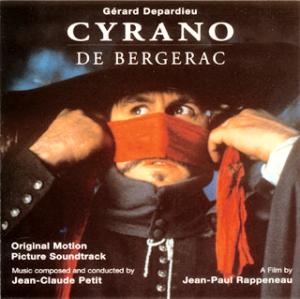************************************************************** EDITOR’s RECOMMENDATION February 2004 **************************************************************
Cyrano De Bergerac
Music composed and conducted by Jean-Claude Petit
Thierry Caens, trumpet
Available on Colosseum CST 80462
Running time: 49.55
Crotchet

Compared to their American counterparts, European films and their composers have always been relegated to the back seat. The North American public often misses marvellous scores that deserves attention. Because of financial and marketing ploys (or lack of them), these compositions are available only to the European market and to a small number of film score aficionados. This is the case with the rich and wonderful score that Jean-Claude Petit composed for Cyrano de Bergerac (1990).
Winner of the César and the Anthony Asquith Award for Achievement in Film Music, Petit's Cyrano de Bergerac did get attention, but of a kind that the composer would probably have done well without. Petit was sued by composer Danny Elfman for plagiarism. At the express request of director Jean-Paul Rappeneau, Petit quite freely adapted the main theme from Batman. Petit finally won the suit, proving meanwhile that Elfman's music contained some similarities to Petit's music too. But litigation aside, the score is a little gem.
Originally a play written by Edmond Rostand in 1897, Cyrano De Bergerac has been adapted numerous times for movies and the theatre. It is the story of Cyrano, who thinks that he cannot win the heart of Roxane because of his prominent nose. Cyrano, blessed with a gift for words and poetry, then helps his friend Christian by ghost writing letters and reciting speeches on Christian's behalf for his beloved Roxane. She pledges her affection to Christian, and this leads to a truth-telling resolution with a tragic final note.
The disc begins with Cyrano's theme, a soliloquy for trumpet, solemn in tone, expressing Cyrano's tragic fate. This theme recurs most beautifully in 'La Déclaration De Cyrano' in an arrangement for cello, but then evolves into the love theme, which makes this declaration a tender and poignant moment. The love theme heard in this piece shares the same spirit as 'Scène D'Amour' from Herrmann's Vertigo (1958); the complex relationship between Roxane and Christian-Cyrano is also comparable to the one between Scott and Judy-Madeleine in Vertigo.
The second part of the opening number introduces the vivacious theme that Petit borrowed from Elfman. This theme comes back in the sword fight and action pieces entitled 'Le Duel', 'La Porte De Nesle', and 'L'Arrivée de Roxane', which are played with great intensity by a sizeable orchestra. No matter how we feel about this 'borrowing', it works tremendously well, both in the movie and on the disc.
Petit gives a seventeenth century tone to his modern arrangements by incorporating some traditional instruments like harpsichord, lute, and fife. 'La Lanterne Magique' is a delicate piece played on organ. Two short pieces feature voices: a Gregorian style choir in 'La Messe Des Espagnols' and soprano voices in 'Les Nonnes'. Each piece carries its own weight.
Watching the film, one can only be impressed by Petit's integration of the music not only with the images, but also with the words and sounds of the poetic prose recited by Cyrano. The music complements the words without burying them. As it ranges from heroic to tender, the score communicates a familiarity and continuity that makes this music a wonderful trip back to the classical and baroque periods. Petit's score is a valuable listening experience.
Martin Provost
5
We are grateful to Helen San (www.cinemusic.net) for giving us permission to include this review which is currently appearing on her Film Music site.
Gary Dalkin adds:
The above review is a revised version of a review which originally appeared on FMOTW in November 1999. The album has now been reissued with remastered sound, slightly different artwork and notes in French and English in which Jean-Claude Petit explains his approach to the music and explains how at 65 minutes it was an unusually large and ambitious project by the current standards of French cinema. The new disc sounds superb, and though there is approximately 15 minutes more music in the film than on the CD Petit has chosen not to include additional tracks over the original issue. This is not a cause for concern, as the album flows wonderfully well, incorporating all the significant material from the score while remaining a fine listening experience. Not something which can be said for some other, more all encompassing soundtrack albums.
A decade on Jean-Claude Petit's most famous film score remains one of the high points of the genre, lushly romantic, enchantingly melodic, wittily playful and on occasion thrillingly dramatic. It is simply one of the finest film scores of modern times and as an album is a disc which belongs in every collection. If you don't already have it hesitate no longer.
Gary Dalkin
5
Return to Index